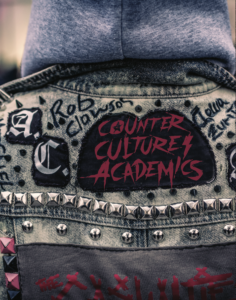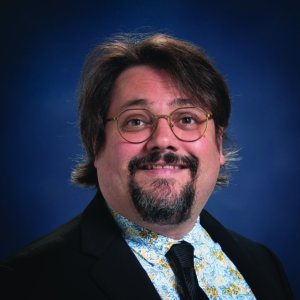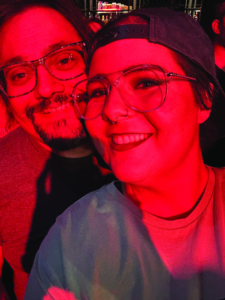Counter Culture Academics – Wings Fall-Winter 2024

What does Heritage University have in common with punk rock music? Alumnus Brian McShane. McShane graduated from Heritage with a B.A. in English in 2014 and an M.A. in Multicultural English Language and Literature in 2017. Last year, he completed his Ph.D. in Composition and Rhetoric from Texas A&M University, where his dissertation focused on punk music.
On the surface, his dissertation seemed about as far away from mainstream academics as one can get. Producing Activists: A Punk Rock Counter story was the culmination of years of study on organized efforts in the punk rock music scene to mobilize youth to participate in the election process.
For many, putting the words academia, punk rock, and get out the vote in a single sentence seems to make as much sense as a bird living underwater. They are concepts that live far afield of each other. Punk rock, after all, is the antithesis of conformity. It’s known for its in-your-face, hard-pounding music, screaming vocals, and anti-government, anti-religion, pretty much anti-anything mainstream lyrics.
For some, the very idea that punk rock has a place in academia seems ludicrous. For die- hard punk rockers, the very thought of being part of the political process that they’ve spent so much time rebelling against is equally ridiculous. Yet, in the aftermath of September 11th, some of the most-followed punk rock bands of the time orchestrated a campaign that shifted thinking, mobilized a fan base, and made the perfect fodder for an up-and-coming doctoral student to study.
THE EDUCATION OF MR. MCSHANE

Brian McShane
Growing up, McShane was the picture of teenage angst in the 1990s. At fourteen, he was hanging out in skateboard parks listening to the anti-establishment punk rock music of bands like Green Day, Social Distortion, and Bad Religion. He was slightly awkward and an avid reader who did well in his New Jersey high school but didn’t have much thought about what would come next.
McShane graduated in 2002 and enrolled in a technical school but dropped out shortly thereafter. Over the next few years, he floated about, taking a course here and there without any real direction. He was living in N.J., attending a small college outside Pittsburgh, Pennsylvania, online. He needed a specific English literature course that was not available at his college in the upcoming semester. Luckily, he found an online class at a university 2,444 miles away in Toppenish, Washington.
Long before COVID-19 forced all college classes online, Heritage’s English program developed a way to take classes remotely. McShane enrolled in one of these classes. He was one of the first undergraduate students to take advantage of this new learning method at Heritage. That single class sparked an idea.
“I thought, ‘Could I really do this for a living?” he said. “Of course, I knew that there were teachers who taught English in high schools, but for some reason, it never really clicked with me that there were careers that could come out of English degrees.”
It was 2005 when McShane transferred from the Pittsburg-area school and enrolled full-time at Heritage.
“Heritage’s online class – specifically the way forums worked – more closely approximated the experience of being in the classroom. Interaction with classmates was more organic, easier to get engaged with, and the instructors were attuned to the ways technology could facilitate that more than any online class I’d ever taken.”
A year and a half later, McShane had his bachelor’s degree from Heritage. The next academic year, he enrolled in the university’s master’s program. His plan was to finish his master’s degree and start teaching at the college level. That is exactly what he did. In fact, he became a member of Heritage’s adjunct faculty, teaching online from his home in Ocean County, NJ. He quickly realized that he needed to earn a doctorate to advance his career in the way he wanted. His Heritage advisor, Dr. Loren Schmidt, suggested he look at Texas A&M.
“I was informed of the school’s stellar job placement rate and the faculty focus on genre- based study. Having just written a science fiction thesis, this appealed to me greatly, as I wasn’t interested in returning to the old canon for the Ph.D.”
DIVING INTO THE COUNTERCULTURE
At the start of McShane’s doctoral program, he thought he would find a nice, safe, classical study area to focus his dissertation. Then, he took a class on composition and rhetoric and was reading someone’s work on the cultural relevance of lobotomies in horror movies.
“Academia has changed a lot over the years,” he said. “It used to be exploring things like science fiction or children’s literature were frowned upon. You had to do the cannons, like Mark Twain. Really, it’s a matter of who sets the standards. Coming here to Texas A&M was great because they encourage you to take on nontraditional things. The program is very current, and we were reading really leading- edge stuff as part of our coursework.”
He considered focusing on science fiction when a class assignment changed his direction. He was presenting a poster as a visual depiction of the value of punk rock music to his class. His professor and mentor, Dr. Shannon Carter, said, “That’s your dissertation topic right there.”

Brian McShane and his wife enjoy the occasional punk rock concert.
At the same time, McShane was reading Asia Martinez’s book Counterstory, the Rhetoric and Writing of Critical Race Theory as part of his Ph.D. studies. It dawned on him that many of the canons put forward in this book were found in the punk music of his youth—things like rebelling against racism and sexism, questioning conventional wisdom, and highlighting marginalized voices. He decided to look at the music through the lens of Critical Race Theory.
McShane explained that when researching your Ph.D., you need to focus your studies narrowly on a specific topic area. He chose to narrow in on the time directly after 9/11 and the relationship between patriotism after a national tragedy and protest music. He examined the rhetoric of the Bush administration surrounding the war effort, punk music’s response to the messaging, and the grass-roots movement that changed a counter culture from disengaged resentment to organized activists engaged in the political process. At the heart of his research was a political literacy campaign called Rock Against Bush with its voter drives, punkvoter.com website, the organization of bands to produce protest music and the corresponding albums and concerts where the music was heard.
“Punk has always been political. As far back as you can trace it, you see music raging against the government and against the establishment,” he said. “But this was a time when things shifted. It was a time when punk music went from ‘everything sucks, burn it down” to “everything sucks, let’s change it,’” he said. “Their goal at the time was to vote President Bush out of the White House. While they didn’t accomplish that particular goal, they did succeed in bringing thousands of young people into the political process to share their voice.”
It took McShane six years to complete his Ph.D., three years of coursework, and another three years of researching and writing his dissertation. In his work he found an academic passion that he hopes to revisit for future projects. He’s also found a way to connect with his students today. During his adjunct teaching days, he would share his experiences completing his research with his classes.
“I’d tell them the bands that organized the movement I studied were the Rage Against the Machine before they were born,” he laughs. “I tell them to look at what is being said in the music they listen to and how it reflects what is going on in the world around them. It is something they can relate to, and they love it.”
McShane started his first full-time teaching position this fall at Paris Junior College in Texas. There, he is teaching Freshman Composition. ![]()
